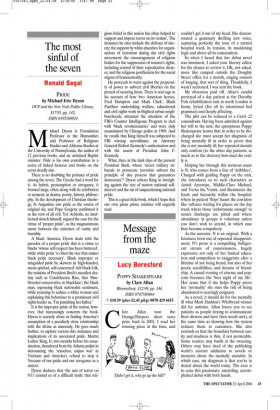The most sinful of the seven
Ronald Segal
PRIDE by Michael Eric Dyson OUP and the New York Public Library, $17.95, pp. 142, ISBN 0195160924 Michael Dyson is Foundation Professor in the Humanities and Professor of Religious Studies and Africana Studies at the University of Pennsylvania, the author of 12 previous books, and an ordained Baptist minister. Pride is his own contribution to a series of linked lectures and books on the seven deadly sins.
There is no doubting the primacy of pride among the seven. The Greeks had a word for it. As hubris, presumption or arrogance, it loomed large, often along with its retribution or nemesis, in drama, poetry, history, philosophy. In the development of Christian theology, St Augustine saw pride as the source of original sin, and Pope Gregory confirmed it as the root of all evil. Yet Aristotle, no intellectual slouch himself, argued the case for the virtue of ‘proper pride’, as the magnanimous mean between the extremes of vanity and humility.
A black America, Dyson deals with the paradox of a proper pride that is a virtue to blacks ‘whose self-respect has been battered’, while white pride ‘is often the vice that makes black pride necessary’. Black improper or misguided pride he skewers in ‘high-handed, mean-spirited, self-concerned’ rich black folk, the minions of President Bush’s manifest destiny such as Condoleezza Rice, that ‘blueblooded conservative in blackface’; the black man, espousing black nationalist sentiment, while yearning to seduce a white woman and explaining this behaviour to a prominent civil rights leader as, ‘I’m punishing her father.’ It is the improper pride of the nation, however, that increasingly concerns the book. Dyson is scarcely alone in finding America’s assumption of a peculiarly close relationship with the divine as unseemly. He goes much further, to explore various dire instances and implications of its associated pride. Martin Luther King, Jr, two months before his assassination, thundered from his Atlanta pulpit in denouncing the ‘senseless, unjust war’ in Vietnam and America’s refusal to stop it ‘because of our pride and our arrogance as a nation’.
Dyson declares that ‘the acts of terror on 9/11 remind us of a difficult truth: that reli gious belief in this nation has often helped to support and impose terror on its victims’. The instances he cites include the defence of slavery; the support by white churches for organisations of terrorism during the civil rights movement; the encouragement of religious bodies for the suppression of women’s rights, including control of their reproductive choices; and the religious justification for the social stigma of homosexuality.
He proceeds to warn against the propensity of power to subvert civil liberties on the pretext of securing them. There is real rage in his account of how ‘two American heroes, Fred Hampton and Mark Clark’, Black Panthers undertaking welfare, educational and civil rights work in blighted urban neighbourhoods, attracted the attention of the FBI’s Counter Intelligence Program to deal with ‘black revolutionaries’ and were duly assassinated by Chicago police in 1969. And he recalls that King himself was subjected to FBI wiretap surveillance, on Attorney General Robert Kennedy’s authorisation and with the assent of President John F. Kennedy.
What, then, in the dark days of the present President Bush, whose ‘secret military tribunals to prosecute terrorists subvert the principle of due process that guarantees democracy’? Dyson echoes King in inveighing against the vice of narrow national selfinterest and the sin of unquestioning national pride.
This is a great little book, which I hope that our own pious prime minister will urgently read.


































































 Previous page
Previous page